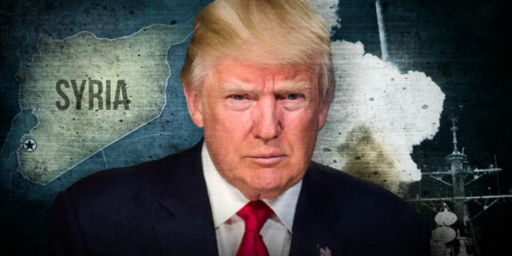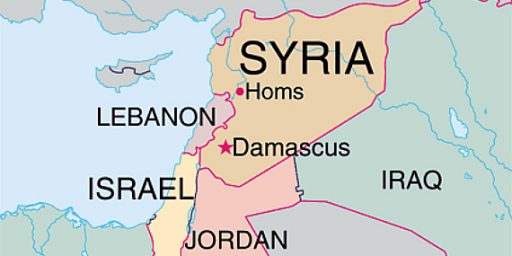Syrian Rebels, Not Government, Used Chemical Weapons Says UN
The infamous "red line" may not have been crossed after all. At least not by the Assad regime.
The infamous “red line” may not have been crossed after all. At least not by the Assad regime.
The Hill (“UN: Rebels, not Assad, appear to have used chemical weapons“):
United Nations human rights investigators said Sunday they have gathered testimony from outside Syria suggesting rebels, not Bashar Assad’s regime, may have used chemical weapons.
“Our investigators have been in neighboring countries interviewing victims, doctors and field hospitals and, according to their report of last week which I have seen, there are strong, concrete suspicions but not yet incontrovertible proof of the use of sarin gas, from the way the victims were treated,” Carla Del Ponte, a member of the independent commission of inquiry on Syria, told Swiss-Italian television. “This was use on the part of the opposition, the rebels, not by the government authorities.”
Reuters (“U.N. has testimony that Syrian rebels used sarin gas: investigator“):
U.N. human rights investigators have gathered testimony from casualties of Syria’s civil war and medical staff indicating that rebel forces have used the nerve agent sarin, one of the lead investigators said on Sunday.
The United Nations independent commission of inquiry on Syria has not yet seen evidence of government forces having used chemical weapons, which are banned under international law, said commission member Carla Del Ponte.
“Our investigators have been in neighboring countries interviewing victims, doctors and field hospitals and, according to their report of last week which I have seen, there are strong, concrete suspicions but not yet incontrovertible proof of the use of sarin gas, from the way the victims were treated,” Del Ponte said in an interview with Swiss-Italian television.
“This was use on the part of the opposition, the rebels, not by the government authorities,” she added, speaking in Italian.
Del Ponte, a former Swiss attorney-general who also served as prosecutor of the International Criminal Tribunal for the former Yugoslavia, gave no details as to when or where sarin may have been used.
The Geneva-based inquiry into war crimes and other human rights violations is separate from an investigation of the alleged use of chemical weapons in Syria instigated by U.N. Secretary-General Ban Ki-moon, which has since stalled.
This is, of course, just one inspector and one investigation. The intelligence agencies of the United States and several of its allies have reached a different conclusion. But they’ve been wrong and the UN right on at least one previous occasion that comes to mind.
Regardless of which side, if any used chemical weapons, it shouldn’t in and of itself lead the United States to intervene in another Middle Eastern civil war. Not even though it undermines American credibility to have its president issue amateur “red line” ultimata and then not follow through. Either it’s in US national security interests to oust the Assad regime or it is not. Either we have a handle on who would replace Assad or we do not. Either there are viable plans for doing so or it is not. And my strong sense on all counts is that the nots have it.





My sense of events in Syria is that neither side in that conflict will be on our side. Is it devolving into a Shiite/Sunni conflict with Assad, Iran and Hezbollah(Shiite) one side and a Sunni/al-Queda/Jihadist on the other side? (Assuming I got the factions right). Are there other factors? If it is too convoluted to figure out, I figure it is best to stay out.
That highlights the key problem in intervening in Syria, even to the extent of supplying weapons to the rebels: there are no good guys. Selecting good guys from among the rebels assumes that the various groups are distinct and unfluctuating for which we have little evidence.
However horrible the situation becomes there are really only two alternatives: butt out or intervene with an objective of pacification and fight everybody. That doesn’t sound like a winning formula to me. Or one that would be popular with the American people.
Just to duplicate myself, I wonder if all the yahoos in the comments to Doug’s article who’ve been howling for us to already have thrown a mess of missiles or ground troops into Syria will moderate their tones in the slightest with this information. Will they even stop to imagine that Obama may have been _right_ to not leap straight into full-invasion-mode on the first hints of chem use, or was his waiting to get actual confirmation perhaps the response of a mature, adult mind?
This is me, holding my breath.
If only he were more experienced, like George W. Bush with his “unacceptable” on North Korean nukes, or his “Dead or alive” on Osama, or his indifference to poor generalship in Iraq and Afghanistan, or his “mushroom cloud” theory of Iraq.
Or maybe he could be more like the experienced Mr. Clinton in Somalia.
Or George HW Bush who let the Republican Guard escape Kuwait untouched then gave them permission to slaughter marsh Arabs with helicopters.
Or Carter in the Iran hostage crisis.
Or the experienced Mr. Reagan who first blundered into Lebanon then bugged out sending a message of weakness. And who gave weapons to Iranian terrorists in a bizarre scheme to finance Nicaraguan contras.
Or Ford with the Mayaguez incident.
Or Nixon with the bombing of Cambodia.
Or LBJ with the entirety of Vietnam.
Or JFK with the Bay of Pigs.
Shall we go on?
This is a random quote by a random UN official based on hearsay reports. It is in no way comparable to, say, Hans Blix’s official results. Furthermore, count me as extremely skeptical that any rebel force out there has the equipment and training required to do this. Folks, first chemical weapons don’t get fired out of an RPG, second, the Assad regime currently is still holding all of the major storage areas we know of, and third… seriously, are the Syrian rebels – not some random fringe guys, but someone major enough to capture a chemical weapons shipment in quantity – dumb enough to use them right now? When it would screw the intervention balance?
Probably not.
This is why they pay you the big bucks, James – to reprint rumors with complete gullibility and add no meaningful analysis!
How on earth is it not in our national security interests to oust the Assad regime? I assume you think genocidal civil wars are *good* for American security? You may have noticed that this conflict is going to keep radicalizing everyone there until somebody wins. And there’s only one side that CAN win.
@glasnost:
That’s simple.
Israel.
@glasnost:
Replaced with who? Perhaps someone like Hamid Karzai? That would be just great.
@Franklin: Bingo. Unless we want to go in and make Syria a straight-up colony, we have precious little control over who or what fills the vacuum when Assad takes the Big Sleep. Remember Egypt, anyone? How about this question: can anyone here name a single, solitary member of the Syrian rebels who might take over as ruler if they won today? Anyone?
@michael reynolds: It’s been a repeated theme of mine of late that US presidents are almost always amateurs in foreign affairs because of the way they’re selected. We usually elect governors, who have next to no foreign experience, and Obama has only extremely cursory experience in the Senate before running for his current office. And we compound that, generally, with amateur secretaries of state.
Nixon and George H.W. Bush are the only presidents in my lifetime with real foreign policy credentials before taking office. They’re both widely considered outstanding foreign affairs presidents.
@glasnost: This is hardly a random official.
@glasnost: Assad is a bad actor, although arguably less so than Saddam Hussein. Ousting him is, as it was with Hussein, step 1. It’s only good for US interests if he’s replaced by someone substantially better. And that’s not guaranteed. Or even likely. And the bonus is we’re on the hook for the results of the regime we help usher in.
@PJ: You’ve clearly not read much here.
@Franklin: @legion: Right.
Shall we expect John McCain to now advocate that we arm the Assad regime?
@James Joyner:
And yet even the experienced Mr. Nixon and George HW Bush committed major foreign policy errors. And who in the Senate is more experienced than John McCain, who would almost certainly have us in the middle of Syria guns a’ blazin’ by by now?
I’m not sure experience is the important metric here.
@mantis: Wait for the check to clear…
@michael reynolds: My problem with the administration in this instance is that I’m pretty sure they agree with me on the options and the course of action but are nonetheless loudly touting a conflicting policy. That is, I believe they have no intention whatsoever of taking military action. But they’re nonetheless talking big about ousting Assad and pretending that it’s only the Russian and Chinese veto that’s holding them back. The “red line” nonsense is more of the same; I can’t imagine why the calculation would change based on low level use of chemical weapons when tens of thousands are already dead in the civil war.
@James Joyner:
I agree on that. It does feel like one of those bar fight scenarios where you’d totally kick some biker’s ass if only your girlfriend wasn’t holding you back. I’ve never thought we wanted a piece of this fight, and the Obama administration you’ll notice has stayed out of it despite a lot of criticism from your party and your party’s pet pundits. I don’t think it’s a major screw-up to try a bluff, but a minor screw-up? Sure.
@michael reynolds: Agreed. The major screw up would be calling your own bluff and winding up in a war you didn’t want to fight.
Is telling the Assad regime that using chemical weapons is a “red line” with unspecified consequences exactly the same as threatening to take military action to oust the Assad regime? That’s some interesting telepathy, there, James.
As I have said, there are several options between doing nothing and US tanks rolling into Damascus. Here is a non-complete list:
1. Introducing a UN resolution condemning Syrian use of chemical weapons.
2. Putting the matter before the UN Security Council.
3. Pressing for tighter UN sanctions.
4. Arming select rebel groups.
5. Instituting a no-fly zone and conducting air operations in concert with other nations and under UN or NATO auspices.
All of these options look much more likely than US boots on the ground in Syria.
We should also take a step back and look at the purpose of the statement, and its result.The purpose of the statement was to deter the Assad regime from large scale use of chemical weapons against rebel groups. Nearly a year later, there has been no large scale use of chemical weapons against rebel groups. So far, it seems deterrence is working
James’ criticism of Obama’s red line statement seems like Conservatives’ earlier criticism of Mutual Assured Destruction during the Cold War. Very Serious Foreign Policy Experts, too, thought that MAD was foolhardy and risky, even suicidal. Guess what, though, it worked. That’s the acid test of all foreign policy actions. By that test, the Obama red line statement is working.
@stonetools:
I’m thinking it was the Tiger Spray.
@James Joyner:
Assad in control of Syria is a lot better for Israel than if he’s ousted.
Same reason, as why Israel would have preferred if Mubarak was still the leader of Egypt.
The region would have been more stable.
If Assad is ousted and those who take over ends up attacking Israel, then the US might be dragged into it.